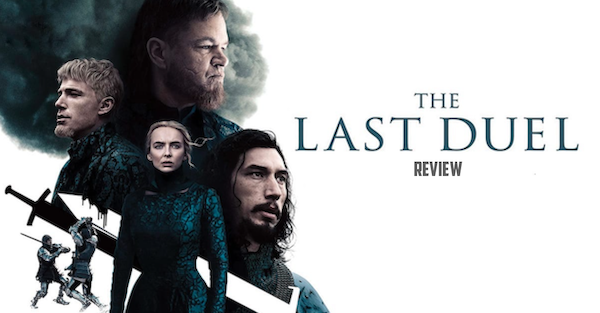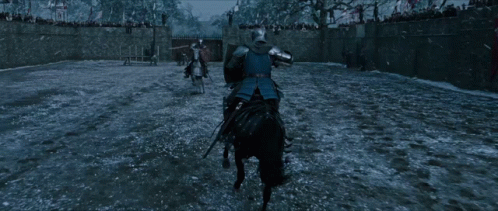The Last Duel: Ridley Scott's Medieval MeToo Rashomon
Based on actual events, the film unravels long-held assumptions about France's last sanctioned duel between Jean de Carrouges and Jacques Le Gris, two friends turned bitter rivals. When Carrouges' wife, Marguerite, is viciously assaulted by Le Gris, a charge he denies, she refuses to stay silent, stepping forward to accuse her attacker, an act of bravery and defiance that puts her life in jeopardy. The ensuing trial by combat, a grueling duel to the death, places the fate of all three in God's hands.
The Last Duel is somewhat of a homecoming for veteran filmmaker Ridley Scott (who delivered not one, but two films this year). While there have been glimmers of swordplay in other Scott-directed films, like Gladiator, Kingdom of Heaven, and Exodus: Gods and Kings, it’s been nearly 45 years since he returned to the kind of steel-based repartee that was so central it becomes a prominent fixture in the film’s title. And he makes sure to deliver the goods; the titular duel that bookends the film’s meaty narrative like a hamburger bun is appropriately epic and brutal. In truth, we haven’t gotten a Ridley Scott film that hits this hard in several years.
As badass as the titular duel is, it’s only a small piece of the thought-provoking drama that unfolds. Much like Akira Kurosawa’s classic Rashomon, The Last Duel involves several characters who provide alternative and contradictory versions of the same incident. While it does make a point to highlight the subjectivity of Truth and how the storyteller tends to position themself as hero, the film takes a deliberate detour to pivot its focus away from its varying narratives to emphasis on the lunacy of how one woman’s fate was forced to be determined by the foolish egos of men.
Although the film takes root in actual events from way back when, its core themes are still deeply resonate and topical in our modern age. To pen the tale, longtime friends Matt Damon and Ben Affleck teamed back up (which is exciting, considering their last screenwriting venture was Good Will Hunting), alongside Nicole Holofcener, the latter really bringing a much-needed level of sensitivity to the film’s heavy subject matter. With Eric Jager’s novel “The Last Duel: A True Story of Trial by Combat in Medieval France” as a framework, the trio concoct a robust, compelling, provocative, and surprisingly funny period piece where #MeToo and the medieval find a harmonious symbiosis.
Scott seemed thoroughly engaged in the material — more enthusiastic and vigorous than we’ve seen in years — and he really directed the hell out of the thing, which is especially impressive considering he was in production at the height of the pandemic. He effectively punctuates the drama with spats of visceral violence, and does an excellent job creating uncomfortable scenes and moments of white-knuckle tension. He also adds little symbolic touches to the character’s varying accounts, particularly through the use of a white and black horse that flip flop depending on whose “truth” we are in, which add interesting layers to the greatness that’s already on the page.
On top of all that, the film is excellently performed. Damon and Driver are as great as you’d expect them to be. Affleck almost steals the show in his supporting role as Count Pierre d'Alençon, but it’s Jodie Comer who shines the brightest as Marguerite de Carrouges. The film’s Rashomon structure also allowed the performers (particularly the three central leads) to add little nuances to each recounting of events, which added another layer of fascination to the film’s unfolding.
Recommendation: The Last Duel is a nearly perfect film, one that delivers thought-provoking drama and a tauntly climactic final battle. Definitely give this one a watch if you haven’t already.
Rating: 4.5 battles of honor outta 5.
What do you think? We want to know. Share your thoughts and feelings in the comments section below, and as always, remember to viddy well!



